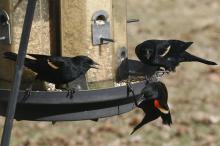Birds
2013
Peter Huntington will be glad to hear that not only was the scissor-tailed flycatcher that he spotted at Pond View Farm last week found again, but it was photographed. Wendy Elsner found the scissor-tailed flycatcher cavorting with eastern kingbirds in the dunes off Edgartown Great Pond on July 8. She was able to take several photos of the birds. This is approximately the tenth record of this southern flycatcher on the Vineyard since it was first seen in 1942! Most of the other sightings have been in the early spring or fall.
There are a couple of birds that I actually do not like, amazing as it may seem. The two are the European starling and the house sparrow. Why, you ask? Well, neither species is native and both are overly aggressive. This aggression is detrimental to many of our native songbirds.
At 6:45 a.m. on a Saturday
morning near the Poucha Pond salt marsh at Chappaquiddick, a few fishermen lined the shores and a handful of binocular-bearing biologists and birders walked through the dunes. Otherwise, the land was bare of human activity.
But in the sky a bird with deep black and bright white striped wings swooped nearby. The binoculars went up.
“That’s a willet,” said Luanne Johnson, director of the nonprofit BiodiversityWorks dedicated to wildlife research, monitoring and mentoring.
I broke two Cardinal rules of birding and blew it for my two birding companions, Lanny McDowell and Warren Woessner. We were birding around Crackatuxet Cove by the old Pearl Factory where we understood that there was a willow flycatcher nesting. Willow flycatchers are not a common nesting species on the Vineyard, so we wanted to see it. We were in the car driving out slowly toward the Katama Airport when all three of us spotted the flycatcher at the same time. Warren stopped and without thinking I quickly jumped out of the car.
Luanne Johnson and crew from Biodiversity Works recently had an opportunity to help capture willets and fit them with geolocation data loggers, which are also known as bird loggers, geologgers, geolocators or GLS. Joe Smith, a research ornithologist from New Jersey and a pioneer in geolocator tagging, came at the request of Biodiversity Works. The crew went to three locations: Little Beach in Edgartown, the Narrows and the beach next to Poucha Pond on Chappaquiddick.
While winter storms have threatened some waterfront homes, they’ve been a boon to nesting piping plovers, who prefer the scoured beaches left by storms and hurricanes. But this year’s population of the tiny migratory shorebird still face challenges from predators.







